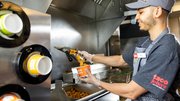Operations
5 key steps to getting started as a franchisee
Succeeding as a restaurant franchisee requires careful planning, including location selection, thorough training, hands-on management, resilience and strong customer relationship management, in addition to leveraging the franchisor's proven systems and support.

February 21, 2025 by George Tinsley Sr. — Co-founder, vice president, and managing partner of Tinsley Family Concessions, Inc., Tinsley Family Concessions, Inc.
Restaurant franchises can be great opportunities for entrepreneurs, allowing them to operate under a successful brand and its system. They give them a proven business model, detailed training, corporate support from operations to marketing, and a running start on attracting local customers — thanks to brand recognition built nationally over many years.
But all of those positive factors don't guarantee success for franchisees as soon as they open the doors. There are some key areas that should be considered beforehand as you approach becoming a franchisee, such as evaluating the franchise opportunity, checking with former or existing franchisees, building your business plan, legal review of the Franchise Disclosure Document FDD and Franchise Agreement, confirming your financing and reviewing the site development and model (whether it's a lease or land ownership).
Additionally, here are some of the biggest keys for a franchisee to get started properly and to build their business over the long term:
Location, location, location
Location is a big reason many restaurants succeed or fail. Before investing in a site, franchisees should study the brand's target demographics compared with research on the demographics of potential customers in the area. Do they line up? What is the local competition? Will there be enough customer volume?
The real estate costs in the area you're considering must be weighed against revenue projections and other expenses. Accessibility to the restaurant is a huge factor––traffic patterns and available parking space. The business should have a great ingress and egress for customers.
Make training your bedrock
Franchisees must commit to a regimented training program that they can always go back to, one that helps employees learn the philosophy and culture. In my business, we developed training programs for every person coming in, whether they were hourly or management. This way, we could introduce and implement the corporate philosophy and get them fully involved in the team.
Franchisors usually offer comprehensive training to help the franchisee get the business off the ground, and operations teams check in to ensure the company protocols and processes are being applied throughout the business. Franchisees who trust the brand's time-tested practices, show strong brand compliance and focus on operational excellence have the best chance for success.
Typically, when a new employee comes in, they will ask, "What is it like here?" or "What happens here?" If you have a lot of negativity, these employees will pick up on it and won't last long. Selecting a good employee is important, but you have to set them up for success with a strong onboarding and training plan to be followed. A very good trainer with a positive attitude is key here. Everyone has a role, and you need to understand how those roles work together. Having cross-trained employees who can do more than one job is another key to growing a cohesive team and the business.
Be on top of the daily details
The franchisor will have a list of key performance indicators that the brand follows and sets the standard for the franchisee, such as monthly revenue tracking and analysis, operational cost management, employee turnover rates and productivity measures. But those numbers just scratch the surface of the details the franchisee must pay attention to.
It's vital to the success of the restaurant, especially in the early years, that the owner shows up on a regular basis. He or she must be hands-on to make sure that the processes essential for success are being properly implemented and followed. That means the owner must lead by example and make sure the managers manage the team with the same positive leadership.
Franchisees must know overall operations management, which includes oversight of food preparation, inventory control and customer-service delivery. The brand's proven methods can streamline the new store's processes, leading to shorter wait times and happier customers. The consistency between the franchisor operations and the franchisees' operations are key. This is a proven track that is evident in major brands like McDonald's, Chick-fil-A and Starbucks. Consistency!
Be resilient and resourceful
Don't view any obstacle as too high to overcome. I'll give you an example: We turned a major obstacle of a high-volume KFC burning to the ground into an opportunity while doubling the gross sales. We got creative after the fire, and I started selling KFC-prepared chicken out of a food truck that I developed for community members as we rebuilt the restaurant.
By doing so, we continued our momentum within the community, and I was able to keep my employees working in other restaurants so as not to lose talent. Before we started rebuilding, we took into consideration the challenges we had prior to the fire, and when we reopened within a few months, the restaurant's volume increased significantly.
Master customer relationship management
When you open, the community will want to try the "new place." If they have a good experience, they'll tell others. This kind of word-of-mouth advertising gets people coming to try you out. The key on your end is to ensure they have excellent-quality food, great service and a clean environment. It's important to track customer service metrics; most companies do this digitally now.
But that's not all. As the franchisee it is imperative that you interact with customers, taking the extra time to visit with them in-person and listen to their suggestions and feedback. This is the most important kind of marketing you can do –– and it's free. Developing a rapport with them, along with providing good food and service, increases the chances that they will come back frequently and they will spread the word.
It's equally important for owners to get outside the four walls of their restaurant––to spread goodwill in the community and give to good causes. Be active in the chambers of commerce and Rotary Clubs, hire high-performing students, get involved with local churches, and sponsor youth programs and other community-based programs.
Finding success as a franchisee requires full commitment, leadership, organization, and consistency. All of those qualities combined leads to a successful launch and can bring out the best in a franchisee's leadership team, employees and their business over the long term.
About George Tinsley Sr.
George Tinsley Sr. is the award-winning author of Catch as Catch Can: Building a Legacy By Finding Opportunity in Every Obstacle. Tinsley is co-founder, vice president, and managing partner of Tinsley Family Concessions, Inc. Tinsley also was the founder and president of PenGeo Inc., dba KFC, which has been sold. He is president and CEO of GW Tinsley Consulting, Inc. Tinsley played professional basketball in the American Basketball Association and was a two-time college basketball All-American at Kentucky Wesleyan College. He is also a nine-time Hall of Famer in both business and athletics.
 ChatGPT
ChatGPT Grok
Grok Perplexity
Perplexity Claude
Claude








